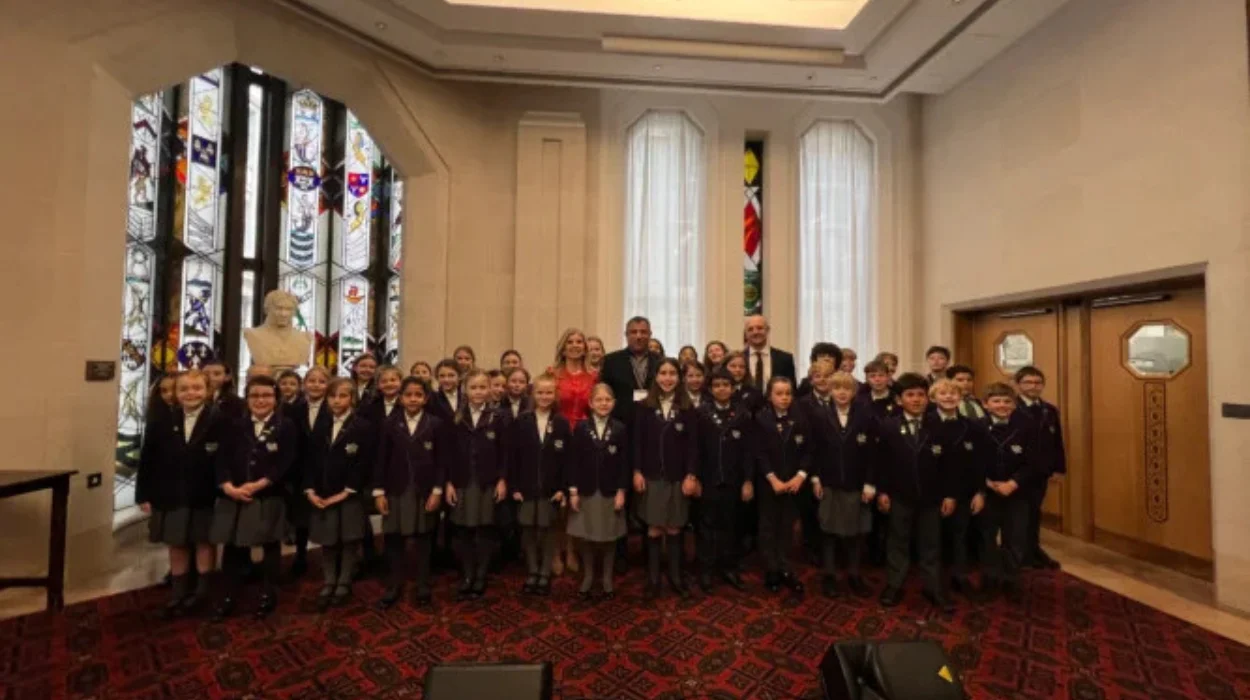Wandsworth (Parliament Politics Magazine) – Young people in Wandsworth commemorate Nelson Mandela, expressing aspirations for a just and united world inspired by his enduring legacy.
In remembrance of Nelson Mandela, the voices of a primary school reverberated Tuesday through the famous Guilhall’s 15th-century walls.
To kick off the Letter to Mandela competition, students from Parkgate House School, located in Clapham Common North Side, performed in a choir at the ancient structure on Basinghall Street in Moorgate.
At the center of the competition were the students from the school, a founding partner in partnership with worldwide humanitarian Nic Careem.
The project, which was inspired by the House of Commons Mandela Legacy Book that Mr. Careem started in 1999, asks kids to write Nelson Mandela private letters outlining their aspirations for a better society.
Catherine Shanley, Principal of Parkgate House School, said:
“We are incredibly proud to be part of this historic moment.
This project has allowed our pupils to connect with the values Nelson Mandela stood for – justice, compassion and unity – linking closely to our Parkgate House Virtues. It has been a privilege to support this initiative from the start.”
At the request of Mr. Careem, the Parkgate House School Choir performed The Messenger, a 1999 composition by music legend Joan Armatrading, as an homage to Nelson Mandela.
The young voices of Parkgate House gave the song a fresh lease on life on Tuesday, although Armatrading had previously played it for Mandela in 2000.
The crowd gave the performance a standing ovation, due to a fresh arrangement by choir director Stephen Davies.
Mr Careem said:
“Parkgate House School has been a shining example of what this competition is all about.
The children’s performance was exceptional, and Catherine Shanley’s support has been instrumental in bringing the launch to life. I’m so grateful for the School’s belief in this vision.”
The first-ever Fatima Campaign UK Summit included Tuesday’s session at Guildhall.
More than 100 organizations came together for the summit, which was hosted by Olympic icon Fatima Whitbread MBE, to support her goal of providing every kid with a better future.
Empower communities by providing skills training, mentorship, and leadership development so that people from all walks of life can become change agents.
Encourage young people to take on leadership roles and participate in civic life, giving them a voice in determining the destiny of the country.
Fatima Whitbread MBE said:
“Parkgate House School captured the heart and soul of the Mandela legacy initiative through their beautiful performance.
The pupils brought joy, meaning and magic to the Guildhall stage. They’ve inspired everyone in the room and will surely inspire many others.”
Following the performance, young members of Westminster Youth Council participated in a panel discussion led by former Dragon’s Den investor Richard Farleigh.
Mr Farleigh said:
“Listening to these bright young voices was humbling and uplifting.
Their clarity, courage and belief in a fairer world reminded us that Mandela’s message still burns brightly in the next generation.”
The Letter to Mandela Competition is now set to engage students across the UK and the world, in a bid to carry forward the legacy of the historic leader.
What are some practical ways to implement Mandela’s vision of a rainbow nation in Wandsworth?
Encourage communities to address previous grievances and work toward reconciliation through open talks and truth-telling forums, emulating Mandela’s preference for forgiveness over resentment.
Encourage restorative justice programs that bring offenders and victims together to foster empathy and healing.
Actively combat prejudice and stereotypes in communities, schools, and workplaces.
Encourage inclusive celebrations, multicultural gatherings, and cultural exchange initiatives that honor and celebrate the diversity of customs, languages, and histories that exist in society.
As Mandela’s first government did, make sure that all groups are represented in decision-making and leadership positions to reflect the diversity of the nation.
Provide equitable access to high-quality healthcare, education, and work opportunities, particularly for historically underserved populations.
Enforce anti-discrimination laws and practices across the board to guarantee equitable treatment for people of all backgrounds, races, and ethnicities.


